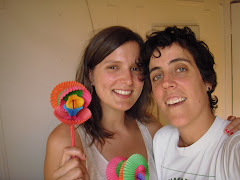

You don't update your blog. We meant to update our blog about our wonderful day yesterday, but it was physically impossible to wake up from our afternoon nap with enough time before meeting a friend for dinner.
SO.... sorry to keep you waiting, but we had another incredible day in Hong Kong. We met up with Shirley Mann, the current Director of Summerbridge Hong Kong and Leo Zen, a former teacher at Summerbridge HK and a current teacher in an all boys school in HK. Unfortunately, both of their schools were closed because of H1N1 so we weren't able to see their schools in action, but we had an incredible conversation with them where we learned a lot about the school culture here.
A couple of things that stuck out from our conversation:
-The students take exams at the end of their 10th grade year. If they pass those exams they are allowed to continue in high school and then have the chance to graduate from high school. If they don't pass those exams (which happens to a fair number of students) then they stop going to high school and join the workforce. However, this system is changing because they want to give everyone a chance to graduate from high school. As with every systematical change (as we well know in NYC) everyone seems a little stressed about it. Will the change affect the quality of education? Will the change give students who would not have otherwise gone one to higher education the opportunity to do so?
-The students who attend the Summerbridge program (check out their website tagged under "Our Supporters") were incredibly upset that the program was closed down for the summer. Summerbridge is a huge opportunity for these students. All of them are low-income students so without Summerbridge, they are kind of stuck at home for the summer without these catchup classes. It also seems like the sense of community that these students gain from attending Summerbridge is something that they really look forward to. It's like an intense academic summer camp that these students look forward to the entire year. Fortunately H1N1 will not last forever and Summerbridge will be open next year. (Sounds like a good enough reason come back!)
-Students love being the top student or really good students. They are pressured from their friends and family and schools to be great students. That is not something we frequently see in our schools. Leo Zen said said something to the effect of: In Hong Kong, you don't want to be the kid who is not good in class, it's the American equivalent to being bad at football.
- Leo teaches at the Diocesan Boys' School which he explained in an email "has a 140-year history in Hong Kong, and the philosophy of the school and its teaching practices have been influenced by an interesting mix of British colonialism, Asian culture, and progressive ideas in education." At this school, they teach both the local curriculum and the IB curriculum. He is chaperoning a school trip to Uganda this summer where 15 students and 3 teachers will travel there to build houses.
- Currently, there are three types of schools in Hong Kong.
1. Local "public" schools: They are government run schools where the students go based on where they live and they pay no tuition, but possibly school fees for uniforms and books. A portion of these schools are CMI (Chinese Medium Instruction), where all subjects are taught in Cantonese, except English. This is controversial because there are no Universities in Hong Kong that are CMI. Shau Kei Wan Government Secondary School, however, is a government school that is not CMI.
2. DSS (Direct Subsidy School): It is the Hong Kong equivalent to a charter school, where the schools have more autonomy and are able to choose their own curriculum and decide on the pay scale for their teachers. Diocesan Boy's School, which was once a government school, is now a DSS school.
3. International Schools or ESF (English School Foundation): These schools are the equivalent of top American private schools, with International Baccalaureate and AP programs and all instruction in English.
-Because of the large number of students in a class (this is the first place that Ellie has not been able to impress anyone when she tells them she has 34 students in each class) teachers often use a microphone.
-Things like Special ED and IEP's do not really exist here, which is obviously a problem for some students.
-Students that move back to Hong Kong from the US often do poorly in their math classes.
There is such a cultural difference in the way education is viewed here. The top math student here is like the quarter back of an American High School. We think that is pretty indicative of what we are up against when we are teaching in our classrooms.

No comments:
Post a Comment